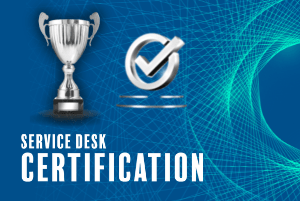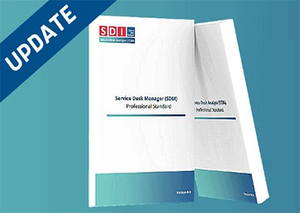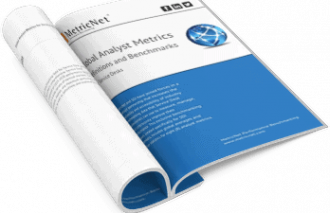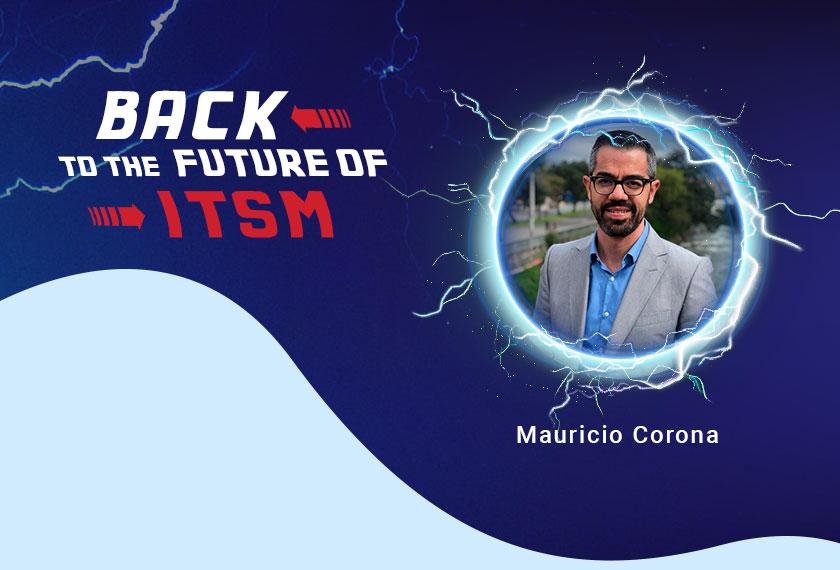
In the last part of our blog series, ‘Back to The Future of ITSM’ we reached out to Mauricio Corona, Ph.D. Chairman BP Gurus & GESEDIG, SDI CTO.
Mauricio shared his expert views on the following:
- The real value of intelligent automation
- Where to start with intelligent automation?
- What sectors are the most advanced in adopting, and which ones are underutilising automation?
- What will be the biggest technology trends going into 2023
Let’s get started!
The Real Value of Intelligent Automation
How would you explain the value of intelligent automation?
We call intelligent automation a combination of next-generation technologies like artificial intelligence, business process management, and Robotic Process Automation. Artificial Intelligence also considers other technologies like:
- Analytics
- Machine learning
- Deep learning
- Natural language processing
Combining those technologies has enabled intelligent automation to deliver some of the most advanced solutions that renowned business leaders are implementing nowadays. Businesses are extensively using actual intelligent automation trends to produce and process large amounts of data, automate end-to-end operations, and make tasks faster and more efficient than ever.
“Many studies have shown that intelligent automation implementation delivers a high Return on Investment (ROI) of about 200-300%.”
– Mauricio Corona
During the pandemic, business leaders had to accelerate their digital transformation programs using digital technologies to address remote work and maintain the value they offer to their customers. The availability of new cloud, social, mobile, and AI technologies has led customers to expect better products, instant response times, and more personalised and frictionless services. To address these higher expectations, companies digitised as many manual business processes as possible.
Intelligent automation is here to help digitalised business processes, avoid repetitive processes, innovate new products, and adapt to changing business conditions.
With it, everyone in the organisation can enhance customer experiences and increase productivity.
Where to start with intelligent automation?
In the coming years, we will see an increase in the adoption of digital supply chain technologies and technologies that improve human decision-making. One of the main mistakes around intelligent automation is thinking of bots, not algorithms. In reality, AI is enabled by one or more algorithms that condition products and services, understanding service as a means of delivering value to a consumer.
So today, we are seeing an explosion of algorithms and the near future tells us that we will be interacting with increased products and services enabled by these algorithms.
Digital transformation tries to leverage organisations through the extensive use of technology, and AI is an enabler of digital transformation.
However, If organisations focus on the term ‘digital’ rather than the word ‘transformation’, they are doing it wrong. Digital transformation, like any other type of transformation, involves people. That is why it is essential to train employees with a digital mindset.
– Mauricio Corona
A digital mindset is a set of attitudes and behaviours that enable people and organisations to see and generate awareness of how data, algorithms, and AI open up new possibilities toward a successful path for organisations through intelligent technologies.
Any project involving advanced technology must be based on 4 pillars. People and processes must be well structured and optimised using agile methodologies (Lean, Agile, Scrum, etc.).
It is necessary to focus on the problem we want to solve, not the technology to be implemented. There are many types of advanced technologies and algorithms.
However, the reality is that the versatility is immense.
The fourth pillar is business partners, who, with their expertise, will help us shorten the time it takes to adopt modern technologies. A business partner is a company that is an expert in something that will be involved in our business model and will help us enable it.
It is not a transactional provider; it is our business partner!
What is the typical roadmap the companies will go through if they wish to adopt automation?
It’s important to establish that everything has more to do with strategies rather than technology. AI has more to do with strategy.
So, we have to focus on the ethical and responsible part of using algorithms, which is fundamental. Not because it is a modern technology but because it is a technology that does well by default.
It’s essential to pay attention to the ethical part, legislation, etc. To avoid bias and ensure it’s fair. That is why the human resources department currently plays an extremely important role in mapping digital skills within organisations.
All organisations are different, and so are their skills. However, a common factor is raising awareness among all staff of the importance of these new technologies.
– Mauricio Corona
Once this is achieved, we will begin to make an organisational diagnosis to identify each of our collaborators’ competencies. Then creating groups by competencies and generating a roadmap toward creating our digital mindset without losing sight of our business model and strategic goals.
Who is Doing It Right, and Who is Behind?
Nowadays, businesses are using intelligent automation to produce and process vast amounts of data, automate end-to-end operations, and make tasks faster and more efficient. Some companies are creating software bots that gather customer data from many sources, and with this information, they are enhancing their customer experience.
This is the case of financial services using AI to adapt customer expectations by launching new services or better “trained” bots. Another benefit of AI is the improvement of employee engagement, as this technology releases employees from repetitive tasks. Using robots and providing employees more time to spend on high-value and strategic work can also boost their morale with more time to create and innovate.
At the same time, in a survey by Deloitte, 95% of organisations that had implemented RPA said it had improved their productivity. For that and many other things, AI has already been adopted by businesses to different specialisations in industries to streamline and automate internal processes.
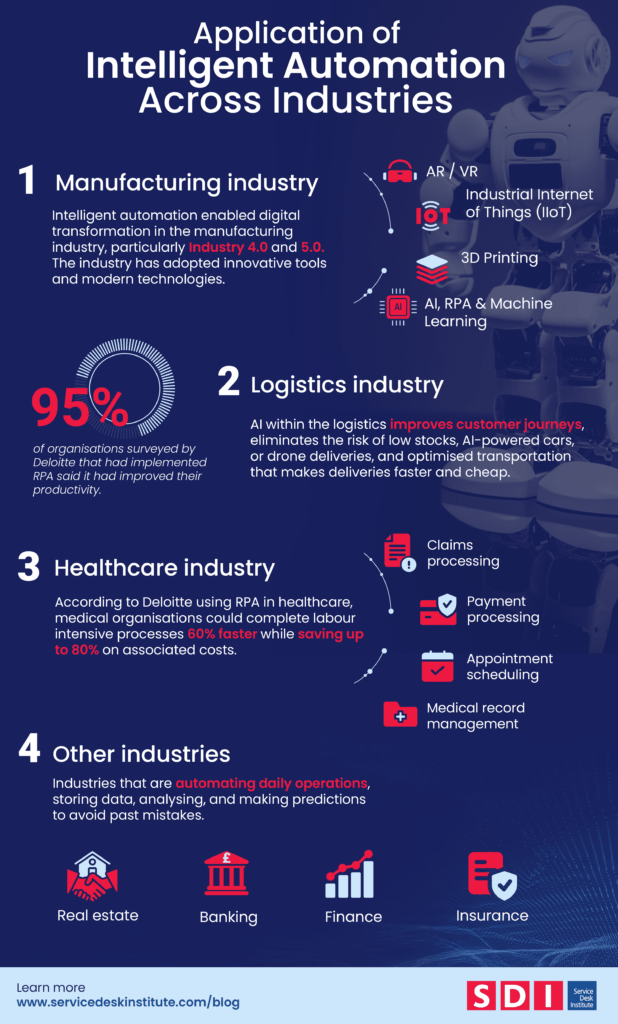
#1 Manufacturing industry
Intelligent automation enabled digital transformation in the manufacturing industry, particularly Industry 4.0 and 5.0. The industry has adopted innovative tools and modern technologies, including:
- AR/VR
- 3D printing,
- Industrial Internet of Things (IIoT)
- Artificial intelligence & Machine learning
- Robotic process automation and more
The reason is proper and quick processing of huge amounts of data, predictions based on data analytics, and increased quality control.
#2 Logistics industry
The implementation of AI within the logistics industry drives process automation and optimisation for providing improved customer journeys.
It eliminates the risk of low stocks, AI-powered cars, or drone deliveries, and optimised transportation that makes deliveries faster and cheap.
#3 Healthcare industry
The healthcare industry is one of the best at keeping up with all innovations on the market to improve medical services and treatment courses.
Some medical facilities have already adopted RPA to eliminate doctors during different kinds of operations. Also, AI is already widely used within healthcare software systems to process vast amounts of medical information about patients to provide accurate diagnoses and personalised treatment plans.
#4 Other industries
We can also talk about AI in real estate, banking, finance, or insurance. Industries that are automating daily operations, storing data, analysing, and making predictions to avoid past mistakes. An analytics insight survey found that companies and organisations continue to use automation combined with AI and predict that 80% of companies will use this technology by 2025.
The industries most likely to benefit from this technology will be retail and consumer products and energy and utilities. They will see a significant improvement in the quality of operations, an improved customer experience, decreased queries, and a boost in productivity.
What do you think will be the biggest technology trends going into 2023?
The biggest technology trends we could expect include:
- Broad adoption of RPA across industries like insurance, banking, finance, and healthcare that triggers enhanced operational efficiency, reduced time-to-market and ensured high security.
- Adoption of Generative AI based on algorithms and machine learning methods for various purposes that can speed up organisational growth and development.
- Rise of adoption of collaborative robots.
- The growing impact of augmented intelligence to improve cognitive performance.
- The rising adoption of NLP technology and conversational AI opens a variety of opportunities.
- Ubiquitous Artificial Intelligence & Internet of Things company’s developments, such as applications and devices that will take care of the safety of its users.
- Alternatives to cloud computing: edge & fog computing.
- 5G network
- Chatbots
About author:
Mauricio Corona Ph.D. Chairman of BP Gurus & GESEDIG, CTO at SDI. Mauricio is an experienced IT and ITSM professional, globally considered one of the Top 25 Thought Leaders in Technology and Service Management.


